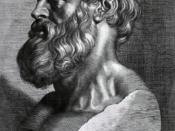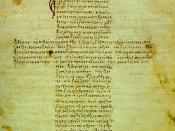Hippocrates is Greek physician, who is often called 'the father of medicine.' Despite the existence of an elaborate tradition surrounding his name, modern scholarship recognizes that actually very little is known about his life, his activities, or his writings, and what is known is based indirectly on authors who lived at least 200 years after his death. The only contemporaries or near contemporaries who mention him are Plato, Aristotle, and Menon, a pupil of Aristotle. The influence of Hippocrates and of the Hippocratic writings has, however, been very real. It has incontestably helped in freeing medicine from superstition and speculative hypotheses.
From the slender sources available, we learn that Hippocrates was born on the island of Cos in the Aegean Sea about 469 B.C. His father and first teacher was Heraclides, who belonged to the fluid of physicians. His mother was a mid wife, and his grandfather, also named Hippocrates, a physician.
The numerous claims of his heroic ancestry, all mythological, indicate the position held by hippocrates in the minds of the Greeks.
Following the death of his parents hippocrates went to Athens, where he studied under the celebrated sophist and rhetorician Gorgias of Leontine and Gorgias' brother Herodicus, the gymnast. Plato states that hippocrates taught medical students for a fee. He is believed to have led the life of a wandering physician, traveling extensively throughout Greece and Macedonia. He died about 377 B.C. and was buried at Larissa in Thessaly. Aristotle says that within a few years after his death he was already known as 'the Great Hippocrates.'
Even less is known about the writing of Hippocrates than about his life. For centuries it has been recognized that the 70 or so treatises that make up the writings often attributed to Hippocrates are a heterogeneous group whose...



mhmh
it seems to me that this information was acquired from an online database. It would be nice if you at least source the work.
0 out of 0 people found this comment useful.